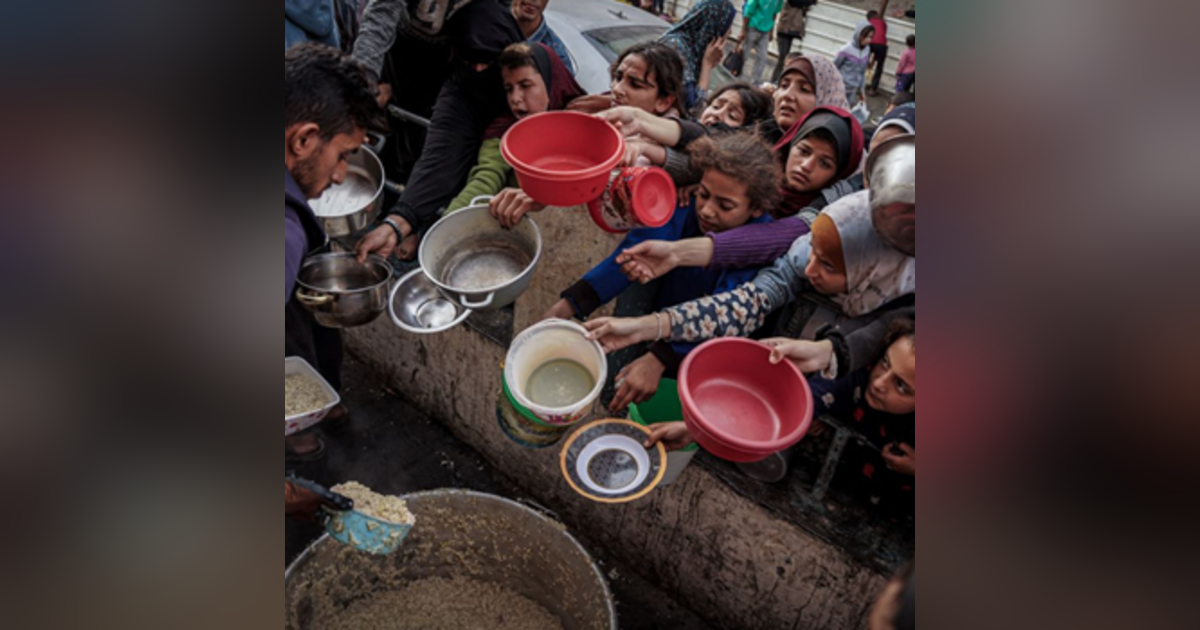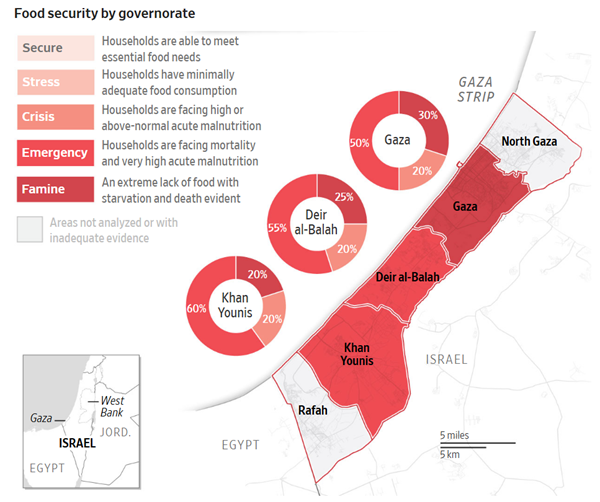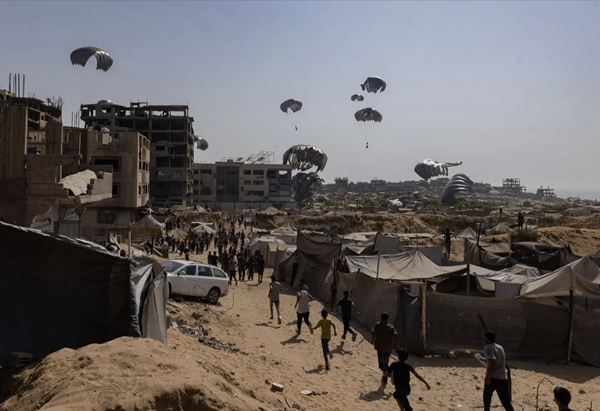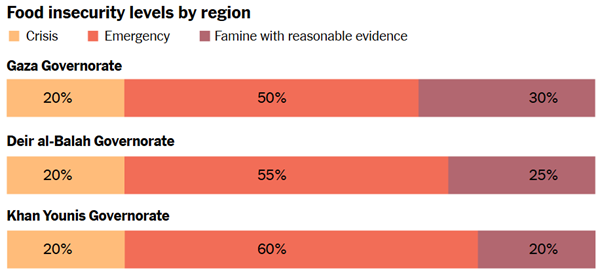Gaza Famine Declared: UN Warns of Starvation Amid War and Aid Blockade

Show notes Learn how UN experts confirm famine in Gaza City as war, Israeli aid restrictions, and collapsed infrastructure push millions into Starvation and acute malnutrition. Supporting links 1. Tom Fletcher [YouTube] 2. Integrated Food Security Phase Classification [Wikipedia] 3. UN experts warn that over [UN Organization] Contact That's Life, I Swear Visit my website: https://www.thatslifeiswear.com Twitter at @RedPhantom ...
Show notes
Learn how UN experts confirm famine in Gaza City as war, Israeli aid restrictions, and collapsed infrastructure push millions into starvation and acute malnutrition.
Supporting links
1. Tom Fletcher [YouTube]
2. Integrated Food Security Phase Classification [Wikipedia]
3. UN experts warn that over [UN Organization]
Contact That's Life, I Swear
- Visit my website: https://www.thatslifeiswear.com
- Twitter at @RedPhantom
- Bluesky at @rickbarron.bsky.social
- Email us at https://www.thatslifeiswear.com/contact/
Episode Review
- Submit on Apple Podcast
- Submit on That's Life, I Swear website
Other topics?
- Do you have topics of interest you'd like to hear for future podcasts? Please email us
Interviews
- Contact me here https://www.thatslifeiswear.com/contact/, if you wish to be a guest for a interview on a topic of interest
Listen to podcast audios
- Apple https://apple.co/3MAFxhb
- Spotify https://spoti.fi/3xCzww4
- My Website: https://bit.ly/39CE9MB
Other
- Music ...
⏱️ 15 min read
A coalition of international hunger specialists has confirmed that Gaza City is now gripped by famine — the first time such a designation has ever been declared in the Middle East. The finding adds new urgency to the worsening humanitarian crisis, even as Israel signals plans to widen its military campaign.
The declaration came from the Integrated Food Security Phase Classification, the leading global authority on famine monitoring. For months, the group has warned that Palestinians were facing extreme levels of hunger and malnutrition.
On Friday. Aug. 22, 2025, the IPC said that conditions in northern Gaza, particularly around Gaza City, had deteriorated beyond previous warnings. The lack of access to food has become so severe that the crisis now fulfills the technical threshold of famine — a classification issued only under extraordinary circumstances.
Welcome to That's Life, I Swear. This podcast is about life's happenings in this world that conjure up such words as intriguing, frightening, life-changing, inspiring, and more. I'm Rick Barron your host.
That said, here's the rest of this story
Gaza's Descent into Famine: A Humanitarian Catastrophe Fueled by War and Blockade
Nearly two years into a grinding war that has devastated every corner of the Gaza Strip, international experts have sounded an alarm that can no longer be ignored: famine has taken hold in Gaza City. This crisis is not a metaphorical famine, not an exaggeration of deprivation, but an official determination reached by the Integrated Food Security Phase Classification (IPC), the world's most trusted system for monitoring hunger. According to their latest analysis, more than half a million people in Gaza are enduring the most extreme and deadly conditions measurable — Starvation, acute malnutrition, and the daily risk of death.
UN experts warn that over 500,000 people are already facing starvation, while nearly 2 million more struggle with severe hunger. With Israeli aid restrictions, destroyed infrastructure, and escalating conflict, the preventable raise of people dying will continue to rise daily.
This declaration places Gaza alongside only a handful of modern tragedies. In the past two decades, the IPC has confirmed famine only three times:
Each of those events shocked the global conscience. Now Gaza, already battered by relentless bombardment, siege, and displacement, has joined that grim list. And unlike natural disasters or crop failures, the famine unfolding here is explicitly described by experts as entirely man-made.
A Territory on the Brink
The Gaza Strip is home to around two million people, most of them civilians, and virtually all are now trapped in conditions of severe food insecurity. While the IPC's declaration of famine applies specifically to Gaza City, it warns that other regions — including Deir al-Balah and Khan Younis in the south — are also hurtling toward the same fate by the end of September if nothing changes.
Regional map of food security crisis levels. Courtesy of The Wall Street Journal
The devastation is not limited to the north. Every household across Gaza faces hunger at a level that threatens lives and futures. The report notes that one in five families has already been pushed into "extreme food shortage," meaning entire days without eating, and countless more subsist on scraps. Food diversity is nonexistent. For many, the daily "meal" consists of rice, bread, or lentils, if anything at all. Fresh vegetables are rare, fruit nearly mythical.
One resident, 29-year-old Alaa Haddad of Gaza City, told aid workers he sometimes goes several days without eating. On days he does find food, it comes at immense risk — darting toward aid convoys, dodging chaos, and competing with others equally desperate.
His words are haunting: "Every day is a battle with hunger. I often don't have energy. You become an animal in search of food."
The Forces Behind the Collapse
The IPC's findings are stark: famine in Gaza is not the result of a global food shortage, nor of drought, nor of logistical incapacity. Aid agencies insist that sufficient supplies to feed the population for at least three months are sitting just beyond Gaza's borders. What blocks those supplies from reaching starving families is not a shortage, but politics.
Several interconnected forces have conspired to bring Gaza to this breaking point:
- A crippling blockade: Israel's near-total restrictions on food, fuel, and essential goods have strangled Gaza's ability to survive. While limited deliveries have trickled in under international pressure, aid groups say these remain a fraction of what is needed.
- The collapse of infrastructure: Bombardments and sieges have severely damaged healthcare, sanitation, water systems, and agriculture. Even if food reaches Gaza, the capacity to distribute and prepare it is deeply compromised.
- Mass displacement: Families forced to flee again and again — sometimes dozens of times — leave behind what little resources they had. Constant movement erodes the ability to store food, prepare meals, or maintain a livelihood.
- Escalating conflict: Ongoing military operations obstruct aid convoys, devastate farms, and create conditions too unsafe for humanitarian workers to operate.
The United Nations' top humanitarian official, Tom Fletcher, minced no words: "This is a famine we could have prevented if we had been allowed. Yet food stacks up at borders because of systematic obstruction by Israel. It is a famine openly promoted by some leaders as a weapon of war."
The Israeli Government's Denials
Despite the mounting evidence, Israel's leadership rejects the IPC's findings. Prime Minister Benjamin Netanyahu's office issued a statement calling the report "an outright lie." The government body overseeing aid deliveries, known as COGAT, claimed that the IPC relied on "partial and unreliable sources" and ignored what it described as Israel's extensive humanitarian efforts.
Yet aid agencies counter that while Israel has permitted small increases in food shipments since late July, the amounts fall dramatically short. The IPC confirmed that it had accounted for those measures but still deemed them insufficient.
The Israeli Foreign Ministry went further, accusing the IPC of manipulating its standards — specifically lowering the threshold for child malnutrition from 30 percent to 15 percent. In response, the IPC explained that it used internationally recognized protocols: when weight and height data are unavailable, arm circumference measurements are a standard alternative, with a 15 percent threshold long accepted for famine classification. This method has been used consistently in South Sudan, Sudan, and now Gaza.
Israeli officials have played down the severity of the hunger crisis and blame Gaza’s suffering on Hamas, which triggered the war with its deadly attacks on Oct. 7, 2023, and has refused to lay down its arms.
Children on the Edge
Perhaps the most horrifying dimension of Gaza's crisis is the plight of its children. The territory is home to 1.1 million children, and the number suffering acute malnutrition has skyrocketed in the past three months.
Images emerging from clinics show infants with frail limbs, mothers unable to produce breast milk, and young children wasting away without vitamins or protein. Aid groups report that mortality among children has already surged well past the thresholds that define famine.
The IPC's data reveals that severe hunger among households in Gaza doubled between May and July and tripled in Gaza City itself. As children fall below nutritional survival levels, disease spreads rapidly. Malnutrition weakens immune systems, leaving little bodies defenseless against infections that would otherwise be treatable.
In the words of one aid worker: "We are watching children die not because the world lacks food, but because trucks are not allowed to cross a line on a map."
The Political Battlefield Over Food
Food has become a weapon of war in Gaza. For months, convoys of humanitarian supplies have been denied access or delayed for weeks at border crossings. Aid agencies describe surreal scenes of warehouses full of food waiting in Egypt or Israel, unable to move a few miles into Gaza because of denied permits, inspection delays, or active fighting.
Gaza citizens running for food via air drops. Courtesy of The Wall Street Journal
When convoys do enter, they are often swarmed by desperate crowds. The chaos frequently turns violent, with armed men competing with civilians for sacks of flour or cans of beans. In May, Israel shifted control of the aid distribution system from the United Nations to a U.S.-backed operation run mainly by contractors. That system has been widely criticized for inefficiency and lack of transparency. Hundreds of Palestinians have been killed near food distribution sites, according to Gaza officials and the U.N. human rights office.
Death Toll Rising
The IPC emphasizes that famine declarations require three key conditions:
- At least 20 percent of households face extreme food shortages.
- At least 30 percent of children suffer acute malnutrition (or 15 percent under arm circumference measures).
- Two adults or four children per 10,000 people die each day from starvation or related disease.
Gaza meets all three.
While exact death counts are difficult to confirm due to the collapse of health systems, evidence from hospitals, aid clinics, and surveys leaves little doubt. The IPC concluded that hunger-related mortality is already at famine levels — and likely undercounted. "The absence of data should not be interpreted as an absence of mortality," the report stated grimly.
The IPC said hunger-related mortality has been hard to measure accurately, since many deaths in Gaza remain undocumented. That is why it announced “famine with reasonable evidence”—rather than “solid evidence”—in its Gaza report.
A Preventable Tragedy
Unlike past famines driven by natural disaster or systemic collapse, Gaza's famine is both preventable and reversible. Aid groups stress that enough food exists within reach to sustain the population for months. What is lacking is political will — the willingness to allow aid to flow unimpeded, to guarantee safe access for humanitarian workers, and to stop using starvation as leverage in war.
Food insecurity levels by region. Courtesy of The Wall Street Journal
Tjada D'Oyen McKenna, CEO of Mercy Corps, underscored this point: "We are not facing a logistics, capacity, or resource problem. What's missing is political will. Failure to act will cost countless additional lives."
Global Outrage, Limited Action
The images and reports from Gaza have already sparked international outrage: skeletal children too weak to stand, parents forced into impossible choices, journalists collapsing from hunger. Yet outrage has not translated into the immediate action required to halt famine.
Past famines show the importance of timing. In Somalia in 2011, more than 100,000 people died before the official declaration mobilized an international response. In Gaza, the alarm has sounded while there is still time — but only if action comes now. Each week of delay, the IPC warns, will "exponentially increase preventable deaths."
The Coming Weeks
As we head into September, the IPC forecasts that famine conditions will spread southward. Unless unrestricted aid floods the territory, Deir al-Balah and Khan Younis will soon join Gaza City in the official designation. Rafah, once a relatively safe zone, has seen its population depleted by forced displacement, making a comprehensive analysis impossible.
Meanwhile, Israeli forces prepare for new offensives in Gaza City itself, the very heart of the declared famine. Without a cease-fire to secure humanitarian corridors, aid agencies warn that relief efforts cannot scale to meet the need.
What can we learn from this story? What's the takeaway?
The world is standing at a moral crossroads. The famine in Gaza is not the result of fate or the inevitable forces of nature, but rather a consequence of deliberate human choices. It can be stopped — but only if governments, international organizations, and leaders act with urgency.
As the IPC concluded bluntly: "The time for debate and hesitation has passed. Starvation is present and is rapidly spreading."
To delay any longer is to accept the preventable deaths of tens of thousands, perhaps more. History will remember not only the suffering of Gaza's people, but also the choices of those who had the power to stop it and failed to act.
We cannot let this moment be another instance where we, as a world, say, 'Well, we did all we could.'
Well, there you go, my friends; that's life, I swear
For further information regarding the material covered in this episode, I invite you to visit my website, which can be found on Apple Podcasts, for show notes and the episode transcript.
As always, I thank you for the privilege of you listening and your interest.
Be sure to subscribe here or wherever you listen to podcasts so you don't miss an episode.
See you soon.













